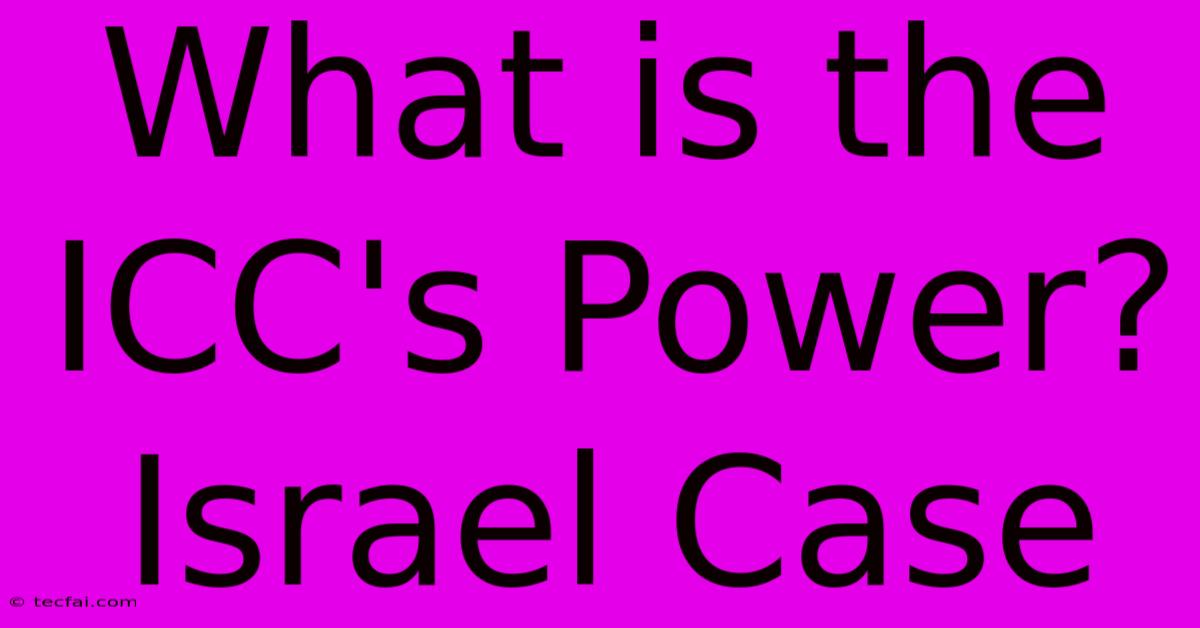What Is The ICC's Power? Israel Case

Discover more detailed and exciting information on our website. Click the link below to start your adventure: Visit Best Website tecfai.com. Don't miss out!
Table of Contents
What is the ICC's Power? The Israel Case and its Complexities
The International Criminal Court (ICC) occupies a unique and often contested space in international law. Its power, particularly concerning situations like the ongoing investigation into alleged war crimes in Palestine, is a subject of intense debate and scrutiny. This article will explore the ICC's jurisdiction, its limitations, and the specific challenges posed by the Israel case.
Understanding the ICC's Mandate
The ICC's primary function is to investigate and prosecute individuals accused of the most serious crimes of international concern: genocide, crimes against humanity, war crimes, and the crime of aggression. However, its power is not absolute. The Court's jurisdiction is determined by several key factors:
- State Party Referrals: A state that is a member of the Rome Statute (the treaty establishing the ICC) can refer a situation to the Prosecutor for investigation.
- Security Council Referrals: The UN Security Council can refer a situation, even if the state involved is not a member of the Rome Statute. This is a powerful tool, but politically fraught.
- Prosecutor's Proprio Motu Investigations: The Prosecutor can initiate investigations suo motu (on their own initiative) if they believe there is sufficient evidence of crimes falling within the Court's jurisdiction and that the situation meets the criteria for admissibility. This is often the most contentious route.
The Israel Case: A Web of Legal and Political Challenges
The ICC's investigation into the situation in Palestine is particularly complex. The situation's admissibility hinges on several key arguments:
- Territorial Jurisdiction: A major point of contention revolves around whether Palestine is a "State" within the meaning of the Rome Statute. Israel argues that Palestine lacks the necessary attributes of statehood, thereby challenging the Court's territorial jurisdiction. Conversely, Palestine maintains its right to self-determination and the applicability of the Statute within its territory.
- Complementarity Principle: The ICC operates under the principle of complementarity. This means that it only intervenes when national courts are unwilling or unable genuinely to investigate and prosecute crimes. Israel argues that its own judicial system is capable of handling such cases. The ICC, however, points to concerns about the impartiality and effectiveness of Israeli investigations into alleged crimes committed against Palestinians.
- Political Motivations: Critics argue that the ICC's investigation is politically motivated and unfairly targets Israel. Proponents of the investigation counter that the Court's role is to uphold international law regardless of political considerations. This point has become heavily politicized, further complicating the legal aspects.
Limitations of the ICC's Power
Despite its significant potential, the ICC faces several limitations:
- Enforcement: The ICC lacks its own enforcement mechanisms. It relies on states to cooperate in arresting and extraditing suspects. Resistance from states, particularly those powerful enough to defy the Court, weakens its effectiveness.
- Limited Scope: The ICC only prosecutes individuals, not states. This limits its ability to address systemic issues that may contribute to the commission of international crimes.
- Political Influence: As seen in the Israel case, political considerations significantly influence the ICC's actions and decisions.
Conclusion: Navigating a Complex Landscape
The ICC's investigation into the situation in Palestine exemplifies the complexities inherent in the application of international law. The debate surrounding the Court's jurisdiction, the principle of complementarity, and the influence of political considerations underscores the challenges in achieving justice in such highly contested scenarios. The outcome of this investigation will have significant implications for the ICC's authority and its ability to effectively address allegations of serious international crimes globally. It's crucial to understand that the complexities of this case are significant and far-reaching, impacting the understanding and application of international criminal justice in the years to come.

Thank you for visiting our website wich cover about What Is The ICC's Power? Israel Case. We hope the information provided has been useful to you. Feel free to contact us if you have any questions or need further assistance. See you next time and dont miss to bookmark.
Featured Posts
-
Blair Honors Labours Prescott
Nov 22, 2024
-
Indian Billionaire Adani Charged
Nov 22, 2024
-
Uk Assists Briton Facing Dubai Prison
Nov 22, 2024
-
2025 Qb Lewis Joins Deion Sanders
Nov 22, 2024
-
Hey Bobo Cafe Boba And Toast
Nov 22, 2024
